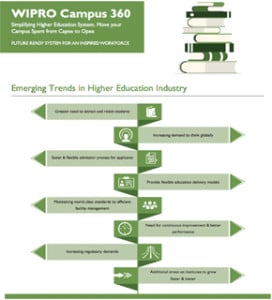
Consumer behaviour, advancement in content publishing, adoption of technological solutions in the education sector to make it smarter are driving significant changes in the education sector. Presently, with the focus on 100 smart cities, Wipro is all set to deliver smarter solutions for smart education in a smart city model. Ashish Khare, General Manager and Business Head, System Integration Solution, Wipro, in an exclusive chat with Bhawna Satsangi of Elets News Network (ENN) finds out the roadmap of the company developed for smart education
What will be the model of smart education in a smart city?

General Manager and Business Head, System Integration Solution, Wipro
Education is a combination of two partsone to enable educational institutes on a self-sustainability completely and include a smart education aspect, which includes smart classrooms, web-based education, online evaluation, enabling the whole education process on a smarter platforms.
The second part is making a campus smart which includes campus surveillance, campus Wi-Fi, campus network, working out the Real Time Location Services (RTLS) which is one of the important aspects of education. We have developed the solution for a women’s only institute in Saudi Arabia around four years back. In BITS Pilani, we have deployed RTLS solution in women’s hostel. There’s sensitivity involved and that’s the reason, security and access becomes an important part of educational institutes.
Another aspect is to enable overall curriculum and evolution system online. If these two things are taken care of, then the coverall education system can be taken care of. These days Idea Internet Network (IIN) is gaining grounds. But then what IIN teaches is a concept and if these are structured programmes, it becomes smart education. IIN is more of a web search. But better and organised way is that you have more structured sessions which are mass communication without the dependence on the quality of a teacher sitting in front of students. Today, the biggest issue in the education in schools as well as in colleges is that education is dependent on the kind of professor or lecturer you have. By enabling these kinds of online sessions and facilitating that will help students.
Will depending upon only online education not fade away the traditional mode of teaching?
It’s always a mix. IIN might be okay from an understanding point of view but a proper education needs a moderator. You can always have an intervention from an expert from the report as a part of smart education but a moderator in front makes a huge difference, especially in smaller classes.
What is the framework that you have developed for the smart solutions for smart education?
This is the area where we work along with our ecosystem partners and one of them is Samsung. The focus is more on enabling technology part. Content is something which we are not focusing at present. While we have an e-learning application, which organises learning session for various people, we also have evolution systems which are largely used within Wipro. We have 1,70,000 people and everyone has to go through certification process internally and that’s the qualification for people to continue in the job. As a process, it is anyway established and working. We do provide that platform but then the focus of Wipro is primarily enabling various technologies.
In your opinion, how will smart city facilitate the education sector?
Smart cities are coming up with various themes. Especially on the green field, education is one good theme which is with the least risk. In the brown field, it may not make a difference. Like Lavasa was initially considered as a leisure city but now they are trying to bring education institutes and that has actually changed the basis. Education is going to be a good and easy enabler for greenfield cities or the upscale cities.
What opportunities does Wipro see while developing smart solutions for smarter education in a smart city?
 Wipro plans to be a technology enabler and that’s why we will go in smart cities and many other educational institutes as an application. We deployed some solutions in Jindal Global School three years back but now looking at them, there are various other universities which want similar solutions. Having a basic communication platform with internet enablement has become a base in most of the higher educational institutes. So, for us growth is in the education segment, from a smart education perspective is not limited to smart city institutes but also in other institutes. As a business company, we look at overall business and not just fixed to some 100 smart cities projects.
Wipro plans to be a technology enabler and that’s why we will go in smart cities and many other educational institutes as an application. We deployed some solutions in Jindal Global School three years back but now looking at them, there are various other universities which want similar solutions. Having a basic communication platform with internet enablement has become a base in most of the higher educational institutes. So, for us growth is in the education segment, from a smart education perspective is not limited to smart city institutes but also in other institutes. As a business company, we look at overall business and not just fixed to some 100 smart cities projects.
Are you also focusing tier 2 or 3 cities to deploy education solutions?
Yes, we are also deploying our education solutions in tier 2 and 3 cities. As an organisation, we are working for the smart campus as an initiative which will include educational institutes as a key driver. We will also work on smart refineries and smart manufacturing plants. Smart cities are one, the smart campus is another from a solution development perspective.
What are the features of smart campus?
 The smart campus is basically developing overall community in a smart campus. Most of the modules which come in a city can easily be adapted in a smart campus because the environment is much more controlled and those cross-functional issues are not there. Today, India’s biggest problem in the smart city is that there is no single head. Municipality head is heading three verticals, for telecom there is somebody else, for electricity there’s someone else. In campuses, integrated solutions are easier to adopt. So, a true smart city replica will actually come in smart campuses or greenfield cities.
The smart campus is basically developing overall community in a smart campus. Most of the modules which come in a city can easily be adapted in a smart campus because the environment is much more controlled and those cross-functional issues are not there. Today, India’s biggest problem in the smart city is that there is no single head. Municipality head is heading three verticals, for telecom there is somebody else, for electricity there’s someone else. In campuses, integrated solutions are easier to adopt. So, a true smart city replica will actually come in smart campuses or greenfield cities.
How does a smart school play an important role in improving the physical performance of the smart city?
Smart education is a term which is related to basic opportunities available in a city. A smart education needs safety and security inside the campus, where you can monitor, surveillance, access to safety system within that building to make sure students are secure.
You can also use the network layer to get best of the knowledge and best of the data technology into your institutes. From an inclusion standpoint, the local concept within the smart city is not going to be relevant, what will be relevant is the smart education that child needs and the seats available in the school. All this can be integrated as a solution and can help in terms of better education.
A smart city is not a debate, it’s a reality today. And then you need to have this component in the smart city to cater to the needs of the people.






















